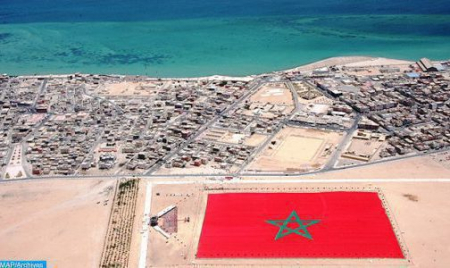Sahara Issue: Diplomatic Battle is Definitely Over for Morocco, Political Expert Says
For Morocco, the diplomatic battle is definitely over, as evidenced by the fact that the only prospect discussed today is that of autonomy under Moroccan sovereignty, says political expert Mustapha Tossa. Even yesterday’s “fierce” and “devious” opponents agree on this today while the international legality embodied by the UN no longer evokes the hypothesis of a referendum that has become over time “obsolete and impractical,” stresses Tossa in an analysis published on Sunday by the news website ‘Atlasinfo’. So what to do with the Polisario and its militias? What to do with the hostages of the Tindouf camps in Algeria? asks the political expert, for whom “these questions have never seemed so relevant and so legitimate as they do today. According to him, what is commonly referred to as the “Sahara issue” is turning into a dead end for the Algerian regime and a great source of anxiety for the international community. For Algeria, the case is complicated and requires contortions whose political price is heavy, because as it remains isolated in its stubbornness to support the Polisario separatists, “the Algerian regime sails to the ridiculous in its contradictions,” says Tossa. He further explained, in the same regard, that on the one hand, Algerian diplomacy claims that it has nothing to do with this conflict, yet on the other hand its army gives lodgings, food and heavy armaments to the polisario militias. On the one hand, the Algerian regime mobilizes its diplomatic arsenal to sell the separatist chimera, on the other hand it refuses to consider itself as a party in this regional crisis and to participate in the round tables that the United Nations is preparing to organize to find a political solution to this artificial conflict, notes Tossa. In terms of losses, the “polisario” has already acted as a destructive venom for Algerian capabilities, he argued. Its support costs enormously to the economy of Algeria which could have mobilized its wealth to heal the social wounds of Algerian citizens, whose majority of young people has for horizon other than the deadly crossing of the Mediterranean, Tossa points out. Moreover, the political expert emphasizes that this Algerian insistence to cling to the polisario has caused an unprecedented isolation of the country as the Algerian regime has been deprived of the income it used to get from its gas pipeline to Europe through Morocco. Since its suspension, Algeria not only loses money that its economy badly needs but also what remains of its credibility as a state the expert adds, noting that European, African and Arab countries would think twice before undertaking anything structuring with a regime that is so “volatile, with changing moods.” Two examples illustrate this situation, explains Tossa, namely the dull anguish that grips Spain, and the European Union behind, in the face of the lightness, even irresponsibility, with which serious issues are treated as it is the case with gas, immigration, insecurity and the fight against terrorist organizations. The second example is the Algerian inability to organize an Arab Summit because of contradictory postures, willingness to sail against tides, sow the seeds of discord, chaos and ruptures when these Arab countries need, more than anything else, cooperation and solidarity, adds the author. Tossa also stresses in this regard that time is running out and Algeria is obliged to join the international community in its support for the autonomy solution proposed by Morocco. If it does so, there is no risk of a popular revolution to oppose it. The polisario issue has never been a matter of the Algerian people but rather a file in the form of a line of credit of the Algerian army; a card of pressure and destabilization, notes Tossa, adding that if tomorrow this turn is taken, “Algeria will be even for some squeaks within the Algerian military seraglio.” An Algerian regime that is beginning to feel the weight of international pressure with the beginning of a sequence of international trials against Algerian criminal leaders of the black decade as illustrated by the trial in Switzerland of General Khaled Nezzar, he notes. At the same time, Moroccan diplomacy will continue to reap successes, he adds. According to him, it is a question of two future issues that must be treated with particular attention. The first issue is to invest in a final political and diplomatic operation, that of dislodging the ghostly “Sahrawi republic” from the authorities of the African Union, and the last summit in Addis Ababa showed that such an operation is within reach and that the African countries are ready to undertake this step. The second issue is to mobilize international attention on the armed militias of the polisario to show the collusion between them and other terrorist organizations in the Sahel region, he underlines.

